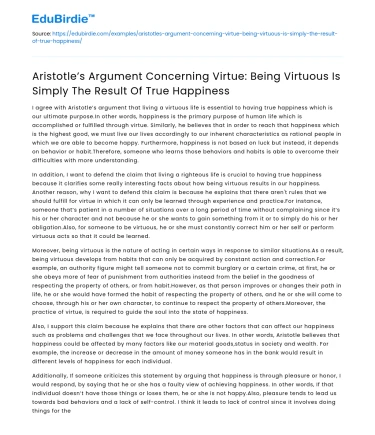I agree with Aristotle’s argument that living a virtuous life is essential to having true happiness which is our ultimate purpose.In other words, happiness is the primary purpose of human life which is accomplished or fulfilled through virtue. Similarly, he believes that in order to reach that happiness which is the highest good, we must live our lives accordingly to our inherent characteristics as rational people in which we are able to become happy. Furthermore, happiness is not based on luck but instead, it depends on behavior or habit.Therefore, someone who learns those behaviors and habits is able to overcome their difficulties with more understanding.
In addition, I want to defend the claim that living a righteous life is crucial to having true happiness because it clarifies some really interesting facts about how being virtuous results in our happiness. Another reason, why I want to defend this claim is because he explains that there aren't rules that we should fulfill for virtue in which it can only be learned through experience and practice.For instance, someone that’s patient in a number of situations over a long period of time without complaining since it’s his or her character and not because he or she wants to gain something from it or to simply do his or her obligation.Also, for someone to be virtuous, he or she must constantly correct him or her self or perform virtuous acts so that it could be learned.
Moreover, being virtuous is the nature of acting in certain ways in response to similar situations.As a result, being virtuous develops from habits that can only be acquired by constant action and correction.For example, an authority figure might tell someone not to commit burglary or a certain crime, at first, he or she obeys more of fear of punishment from authorities instead from the belief in the goodness of respecting the property of others, or from habit.However, as that person improves or changes their path in life, he or she would have formed the habit of respecting the property of others, and he or she will come to choose, through his or her own character, to continue to respect the property of others.Moreover, the practice of virtue, is required to guide the soul into the state of happiness.
Also, I support this claim because he explains that there are other factors that can affect our happiness such as problems and challenges that we face throughout our lives. In other words, Aristotle believes that happiness could be affected by many factors like our material goods,status in society and wealth. For example, the increase or decrease in the amount of money someone has in the bank would result in different levels of happiness for each individual.
Additionally, If someone criticizes this statement by arguing that happiness is through pleasure or honor, I would respond, by saying that he or she has a faulty view of achieving happiness. In other words, If that individual doesn’t have those things or loses them, he or she is not happy.Also, pleasure tends to lead us towards bad behaviors and a lack of self-control. I think it leads to lack of control since it involves doing things for the sake of fulfilling desires. Moreover, in order for us to be truly happy, we ought to control our bad habits, even if it is uncomfortable for us. According to Aristotle, this is the only way to achieve a life filled with persistent happiness, rather than one filled with temporary pleasure from our vices.Another explanation that would support this argument is that not doing the right thing would result in unhappiness.For instance, if someone with a rational soul decides to live a life where he or she is constantly being bad and hurting others, he or she will not be able to achieve happiness. In other words, they wouldn’t have any satisfaction in doing what's wrong but instead they would have many bad outcomes.
Furthermore, I believe living a virtuous life does result in joy.For example, being honest doesn’t result in a bad outcome but instead, it makes us content especially because we made the right decision to be truthful.As an alternative, virtue is the basic quality of to our necessary well being and happiness. I believe that if someone choose to take the wrong path in life and not be virtuous, it would have a really big impact on their happiness. In simple words, being unrighteous results in many negative ways for us in which it doesn’t help us be content. Thus, it gives us the more reason to be virtuous so that we could achieve happiness.
In conclusion, I believe Aristotle's claim that being virtuous is simply the result of true happiness.In other words, doing the correct things in life will ultimately lead to satisfaction.Also,happiness is the highest good because we choose it as the sufficient in itself. Therefore, in order to be happy it’s essential to be righteous. In general, I think that our best interest is to be happy and that being good would achieve that result. Also, If we decide to be good in our lives, it would better our chances to being satisfied. Moreover, pleasure is just a short term fulfillment unlike having virtue to achieve the long term contentment.






 Stuck on your essay?
Stuck on your essay?

